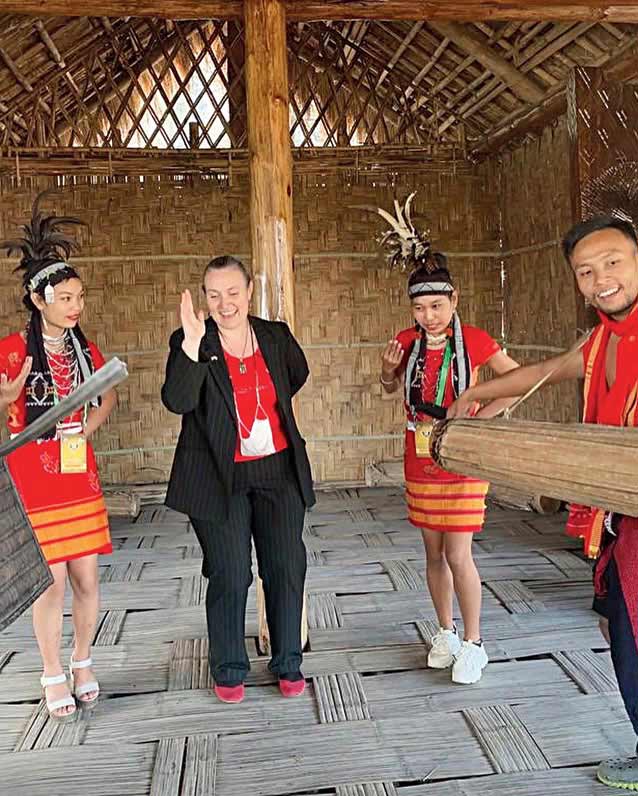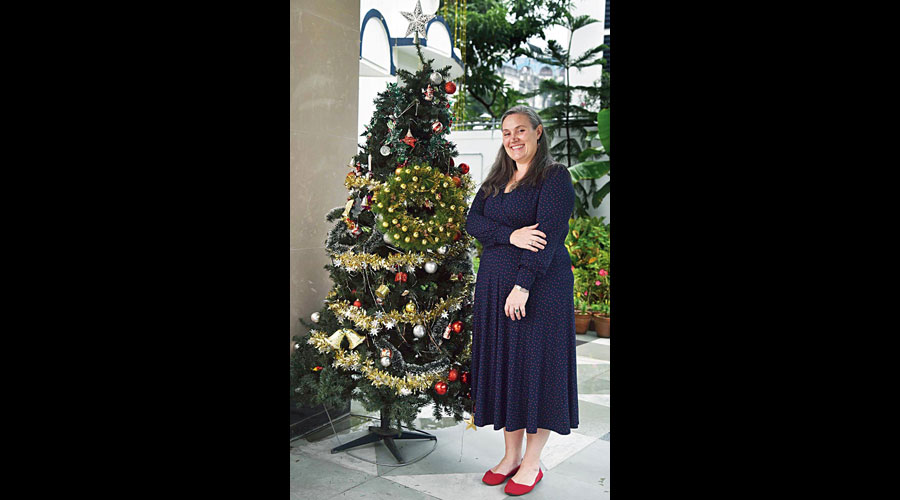The holiday season is in the air at the US consul general’s residence. Christmas trees decorated with baubles and wreathes brighten up corners of the drawing room while strings of fairy lights put up innovatively in a conical shape on the wall frame the greeting cards hung in between. The warm and affable hostess, consul general Melinda Pavek, welcomed The Telegraph into this cheerful space for a chat.
You are all set for Christmas, it seems! How would things be back home around this time?
When I spoke to my partner in Chicago this morning, he said it’s getting cold but it hasn’t snowed yet. People are frantically shopping but of course more shopping gets done online. Everyone is watching the Covid situation and making plans for the holiday that are safe. Hanukkah just happened and my Jewish friends have been celebrating. December is a wonderful month.
What plans have you made?
I’ll be here. My partner and I buy each other a book and over the year, we read the books and we talk about that. It’s not dependant on us being at the same place. That’s what we will do for this Christmas as well. We are both bookworms. He reads much more — almost 40-50 books a year. I try to read two books a month. I am on my 24th book, so I’ve met my target!
What kind of books do you enjoy more?
I choose topics and set a reading list on it. This year, I read a wonderful book called Read to Lead. It explains how to read a book so you remember its contents. This year, some of my choices were specific to my Kolkata assignment, like (Shankar’s) Chowringhee and (Salman Rushdie’s) Midnight’s Children, which is wrapped up in India’s history. I also like personal development books. The most recent title I read is The Compound Effect. Like compound interest that accrues quickly over time, it’s about small habit changes that make tremendous difference in the long term.
You grew up in Minnesota amid the lakes.
Yes, it’s called the land of 10,000 lakes. But in rainy years, we have 14-15,000. It’s like Kolkata that way. If it rains hard suddenly there are lakes everywhere. (Laughs)
But they don’t form right at your doorstep, do they?
In some places they do! I grew up in the country. We built a house in a farmland. For the first couple of years, if there wasn’t a lake of water, there would be a pool of mud. By the time I reached the schoolbus, my boots would be caked with mud. I had to spend time kicking the mud off before I got on the bus. It was embarrassing!
So no farmland adventures for you?
My dad owned a truck shop. The oldest of three sisters, I was exploring less outside and more into the workings of a diesel engine, running errands. My mom had a two-acre garden with vegetables, some fruits and a lot of flowers. I worked with her. That’s why I am grateful for the garden here but glad that there are people to work for it! As a child, you don’t appreciate how wonderful home-grown vegetables taste. Now I do. I enjoy growing vegetables that are easy to take care of. I haven’t had a chance to do that as I arrived here only in August.
You have been to an interesting mix of countries.
My first assignment was in Kathmandu. I was responsible for housing, transportation, procurement, warehousing... My first business trip was to Kolkata, in 2005. We were building a new embassy compound. All the materials were to reach through the Kolkata port and we came down to meet the port officials. My second assignment was in Jamaica, doing visas. It was a busy consular section. I did 25,000 visas that year, my highest. I helped move the consular team in Jamaica. I went to Baghdad for a year when the office was moved from the palace to the embassy. I specialise in new embassy compounds. Then I went to Lahore for two years. They too wanted a new consulate though they didn’t find the property. My previous assignment was in Tokyo.
From new embassies to one of the oldest US consulates... the Kolkata consulate is over two centuries old...
The history here is amazing. Kolkata also reminds me of Lahore. People are warm, friendly, love music, literature and good food. They are entrepreneurial too. There’s a strong business community in both cities.
Kolkata is not a superficial city. It’s not a city that could be anywhere in the world. The diverse cultural experiences of Kolkata are such that when people come here, they are charmed. There’s so much intellectual skill and capacity here. Then there are the Sunderbans. The Hungry Tide (by Amitav Ghosh) is so popular in the US. We need to energise the diasporic community from Bengal to show more of the culture and encourage visitors.

Consul general Melinda Pavek with Naga musicians at the Hornbill Festival
Last week, you were in Nagaland.
Yes, I attended the Hornbill Festival. The Naga tribes, their weaving, dances and music seemed so familiar to me. Minnesota also has a lot of Native American tribes. My hometown is Shakopee, named after a great leader of the Mdewakanton Sioux community. We’d visit Pow Wow, an annual gathering where members of the tribe come together and there’s a celebration. The Hornbill Festival reminded me of that. The artistes at the music festival were so good. Imliakum Aier and his band The Electric Cool Kid was the opening act. He is referred to as Nagaland’s John Meyer. I found his videos on YouTube and am searching for a song that I want to buy. (Pauses) The day after I left, the killings happened. Our deepest condolences to the families and I really hope for a peaceful resolution.
We hope so too. What kind of music does this band play?
Lot of the bands in Nagaland use traditional beats and instruments and apply a modern edge to that. The way they play their guitar is different and the way they create their music is inspired by their heritage. The opening ceremony of the Hornbill Festival was organised by Theja Meru, who is an International Visitor Leadership Program alumnus from the consulate. It was called the Flight of the Hornbill. It started out with traditional dancers and sounds, flowing through 17 tribes, with their different attires and music, and merged seamlessly with modern music like ABBA and What a Wonderful World. The images in the background of Nagaland matched the music. The Naga tribes, I felt, want to retain their heritage and embrace new ideas.
From Nagaland’s festival to Bengal’s. How was your first Durga Puja? You judged CESC The Telegraph True Spirit Puja.
Yes, it was a great introduction as it took me to a big pandal (to give away the prize). And I appreciated the use of technology (for virtual judging). I also went to two family rituals. Another festival (in Alimuddin Street) I visited was organised by the Muslim community for their Hindu neighbours. It was the first time that area had a Durga Puja in decades. That was really meaningful. Because of Covid, I did not go pandal-hopping, but hope to do that next year.
Coming to the travel situation, how are you coping with visa applications?
We have issued a record 62,000 student visas so far, despite starting late, in July. We usually start in May. Still our consular staff managed by working longer hours. We are in our second season of student visas now for those who need to start their programme in January-February. But till May, we will focus on worker visas and renewing of B1 and B2 travel visas. We are opening up appointments for January through May. There will be slots for new visas too.
Are you expecting family to visit?
I’m hopeful that my parents will visit next Fall. My sister in Japan is talking of May 2023, during the kids’ school holidays. I plan to take my nephew for a walk along the Hooghly and may be to Kumartuli. My sister and I have talked for years about visiting the Sunderbans.
Roads less travelled
Pavek’s travel tips to visit the two states in the US she calls home:
Once Covid is over, people will want to travel more for experiences than into intense crowded places.
- In Wyoming (her residence):
Visit Jackson Hole valley — for the national parks, including Yellowstone. You can do white water rafting in the rivers. In winter, you can snow ski.
- In Minnesota (her family seat):
Visit Minneapolis for the arts scene. It’s a testing ground for shows that would open on Broadway. And for the Lakes. Paddle into the Boundary Waters (bordering Canada) in a canoe and go camping.
